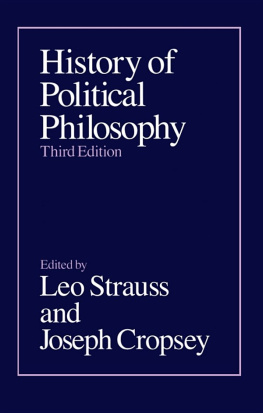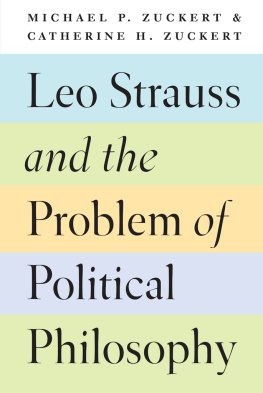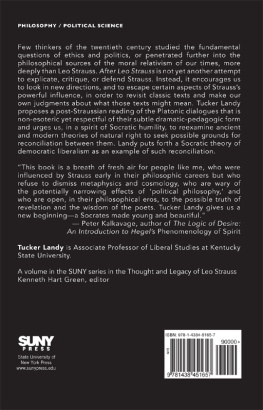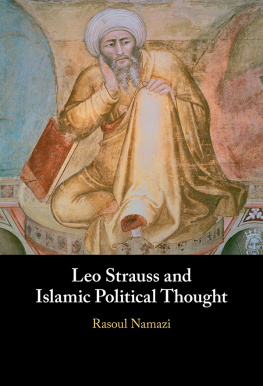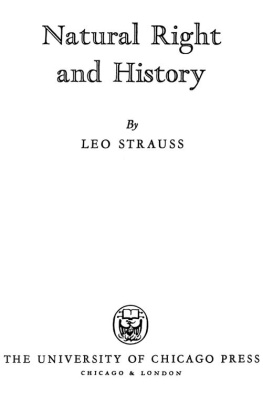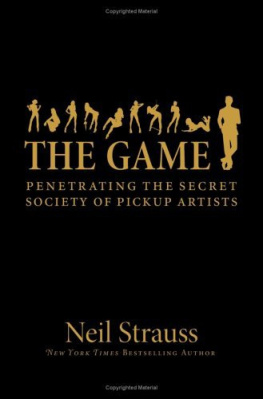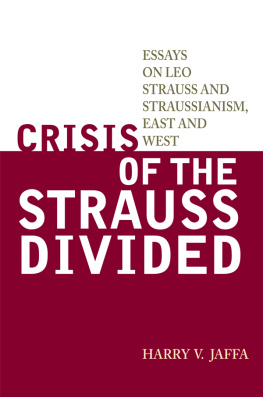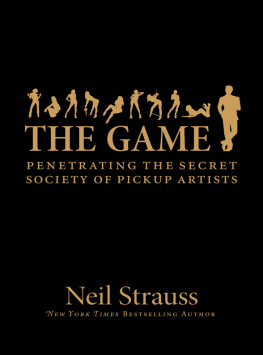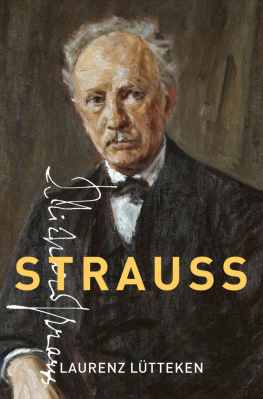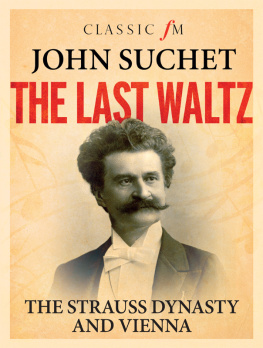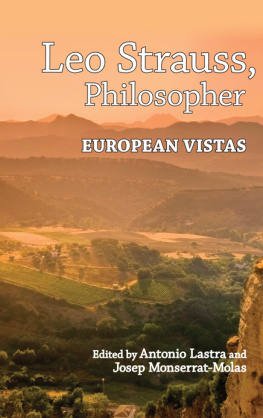Strauss Leo - Leo Strauss on Moses Mendelssohn
Here you can read online Strauss Leo - Leo Strauss on Moses Mendelssohn full text of the book (entire story) in english for free. Download pdf and epub, get meaning, cover and reviews about this ebook. City: Chicago;London, year: 2012, publisher: The University of Chicago Press, genre: Science. Description of the work, (preface) as well as reviews are available. Best literature library LitArk.com created for fans of good reading and offers a wide selection of genres:
Romance novel
Science fiction
Adventure
Detective
Science
History
Home and family
Prose
Art
Politics
Computer
Non-fiction
Religion
Business
Children
Humor
Choose a favorite category and find really read worthwhile books. Enjoy immersion in the world of imagination, feel the emotions of the characters or learn something new for yourself, make an fascinating discovery.

- Book:Leo Strauss on Moses Mendelssohn
- Author:
- Publisher:The University of Chicago Press
- Genre:
- Year:2012
- City:Chicago;London
- Rating:5 / 5
- Favourites:Add to favourites
- Your mark:
- 100
- 1
- 2
- 3
- 4
- 5
Leo Strauss on Moses Mendelssohn: summary, description and annotation
We offer to read an annotation, description, summary or preface (depends on what the author of the book "Leo Strauss on Moses Mendelssohn" wrote himself). If you haven't found the necessary information about the book — write in the comments, we will try to find it.
Leo Strauss on Moses Mendelssohn — read online for free the complete book (whole text) full work
Below is the text of the book, divided by pages. System saving the place of the last page read, allows you to conveniently read the book "Leo Strauss on Moses Mendelssohn" online for free, without having to search again every time where you left off. Put a bookmark, and you can go to the page where you finished reading at any time.
Font size:
Interval:
Bookmark:
LEO STRAUSS
ON
MOSES
MENDELSSOHN
Translated
and edited,
with an interpretive
essay, by
Martin D. Yaffe
THE UNIVERSITY OF CHICAGO PRESS
CHICAGO AND LONDON
Leo Strauss (18991973) was one of the preeminent political philosophers of the twentieth century. He is the author of many books, among them The Political Philosophy of Hobbes, Natural Right and History, and Spinoza's Critique of Religion, all published by the University of Chicago Press.
Martin D. Yaffe is professor of philosophy and religion studies at the University of North Texas and the author or editor of several books, including Shylock and the Jewish Question.
The University of Chicago Press, Chicago 60637
The University of Chicago Press, Ltd., London
2012 by The University of Chicago
All rights reserved. Published 2012.
Printed in the United States of America
21 20 19 18 17 16 15 14 13 12 1 2 3 4 5
ISBN-13: 978-0-226-92278-2 (cloth)
ISBN-13: 978-0-226-92279-9 (e-book)
ISBN-10: 0-226-92278-2 (cloth)
ISBN-10: 0-226-92279-0 (e-book)
Library of Congress Cataloging-in-Publication Data
Strauss, Leo.
Leo Strauss on Moses Mendelssohn / translated and edited, with an interpretive essay, by Martin D. Yaffe.
pages. cm.
Includes bibliographical references and index.
This book is an annotated translation of the introductions written by the young Leo Strauss to ten of Mendelssohns writings.
ISBN-13: 978-0-226-92278-2 (cloth: alk. paper)
ISBN-10: 0-226-92278-2 (cloth: alk. paper)
ISBN-13: 978-0-226-92279-9 (e-book)
ISBN-10: 0-226-92279-0 (e-book) 1. Mendelssohn, Moses, 17291786. I. Yaffe, Martin D. II. Title.
B2693.S873 2012
193dc23
2012022901
 This paper meets the requirements of ANSI/NISO Z39.48-1992 (Permanence of Paper).
This paper meets the requirements of ANSI/NISO Z39.48-1992 (Permanence of Paper).
To (Rabbi) Jack Bemporad
Yet wisdom, where can she be found?
Which is the place of understanding?
Job 28:12
C ONTENTS
by Alexander Altmann
by Martin D. Yaffe
T RANSLATORS PREFACE
I
Leo Strauss on Moses Mendelssohn is a translation of ten introductions by the political philosopher Leo Strauss (18991973) to various philosophical writings by Moses Mendelssohn (172986), the leading Jewish figure of the German Enlightenment and the philosophical founder of modern Jewish thought. Strauss composed the introductions in the 1930s as a junior editor of the Moses Mendelssohn Gesammelte Schriften Jubilumsausgabethe Jubilee Edition of Mendelssohns collected writings. This multivolume collaboration among leading German-Jewish scholars, begun in Weimar Germany in commemoration of the bicentennial of Mendelssohns birth, was soon suppressed and all but destroyed by the Nazi regime. Not until the 1970s were the Jubilee Editions previously published volumes reprinted (including two of the three volumes that Strauss worked on), delayed volumes published (including Strausss third volume), and new ones undertaken.
The Mendelssohnian writings that Strauss edited, annotated, and introducedand translated from the Hebrew in the case of two of themspan Mendelssohns celebrated literary career. They culminate in Morning Hours (1785) and To the Friends of Lessing (1786), written as philosophical defenses of the moral and theological respectability of the late Gotthold Ephraim Lessing (172981), Mendelssohns dearest friend and the German Enlightenments outstanding literary figure and theological polemicist. Mendelssohn was responding to the shocking claim by Friedrich Heinrich Jacobi (17431819) that toward the end of his life, having long since moved from Berlin and close proximity to Mendelssohn, Lessing had secretly become a devotee of the philosophy of Benedict Spinoza (163277). To Jacobi and Mendelssohn and their German contemporariesindeed, to any thoughtful reader in Europe during the century or so since Spinozathis would be another way of saying that Lessing had become an atheist.
To judge by initial impressions, the shocking character of Spinozist atheism shows up less in Spinozas magnum opus, Ethics Demonstrated in a Geometrical Order (1677), than in his Theologico-Political Treatise (1670), which is a sort of introduction to the Ethics. The elaborate argument of the Ethics is perhaps shocking enough, theologically at any rate. It collapses God into nature and, at the same time, elevates nature into God. Spinoza cushioned this dual shock to some extent by giving his Ethics the rhetorical look of a geometrical treatise, so as to limit its readership to those who could be expected or encouraged to negotiate its complicated internal cross-references and chains of deductive reasoning. He also took the precaution of publishing the Ethics posthumously and anonymously. Meanwhile, he interrupted writing the Ethics to publish the Treatise, also anonymously. The Treatise is the philosophical founding document of both modern liberal democracy and modern biblical criticism. In the course of its lively, spirited, semi-popular yet formidable argument, it denies the Mosaic authorship of the Pentateuch and, with that, any divinely revealed basis for morality. Not surprisingly, the Treatise gained widespread notoriety almost right away among its intended, theologically minded Christian readership. Compounding the notoriety was the fact that readers soon pinpointed its anonymous author, accurately, as an excommunicated Jew from Amsterdam whofor reasons made plain enough in the Treatise itselfdeclined to convert to Christianity.
A century later, the moral opprobrium attached to Spinoza reached Lessing in the following way. Spinozist biblical criticism had found its practitioners in Lutheran Germany. These included above all Hermann Samuel Reimarus (16941768), whose unpublished Apology or Defense for the Rational Worshipers of God broadens and thickens Spinozas argument about the Old Testament to include the New Testament. After his death, Reimaruss daughter Elise presented her fathers manuscript in confidence to Lessing, who by then was librarian at the Ducal Library at Wolfenbttel, in Brunswick, and as editor of the librarys quarterly publication was exempt from routine theological censorship. By 1774, Lessing began publishing excerpts from Reimaruss manuscript, while preserving their authors anonymity by calling them Fragments of an Unnamed. To the several Fragments, Les sing added editorial Counterpropositions designed to contextualize the radical views of the Fragmentist and separate his own views somewhat from them. Even so, publishing the Fragments upset orthodox Lutheran theologians, and Lessing soon found himself drawn into a lengthy controversy over the Fragments with Pastor Johann Melchior Goeze of Hamburg. Neither the Fragmentist nor Lessing as his editor presents himself as a doctrinaire Spinozist. Reimarus in his other writings had adhered to the natural or rational theology of Gottfried Wilhelm Leibniz (1646 1716), which was predominant in the German universities of Lessings day in the version promulgated by Leibnizs first-generation disciple Christian Wolff (16791754) and was a respectable, if controversial, theist alternative to revelation-believing Christianity among Enlightened Lutherans. In the glare of the Fragments controversy, however, Lessing could appear to have abandoned Leibnizianism for Spinozism. Mendelssohn in Morning Hours gives voice to this opinionif only in order to rebut it while countering Jacobis assertion that Lessing had confessed his recent Spinozism to him in private conversations during the summer of 1780. Among other things,
Next pageFont size:
Interval:
Bookmark:
Similar books «Leo Strauss on Moses Mendelssohn»
Look at similar books to Leo Strauss on Moses Mendelssohn. We have selected literature similar in name and meaning in the hope of providing readers with more options to find new, interesting, not yet read works.
Discussion, reviews of the book Leo Strauss on Moses Mendelssohn and just readers' own opinions. Leave your comments, write what you think about the work, its meaning or the main characters. Specify what exactly you liked and what you didn't like, and why you think so.

